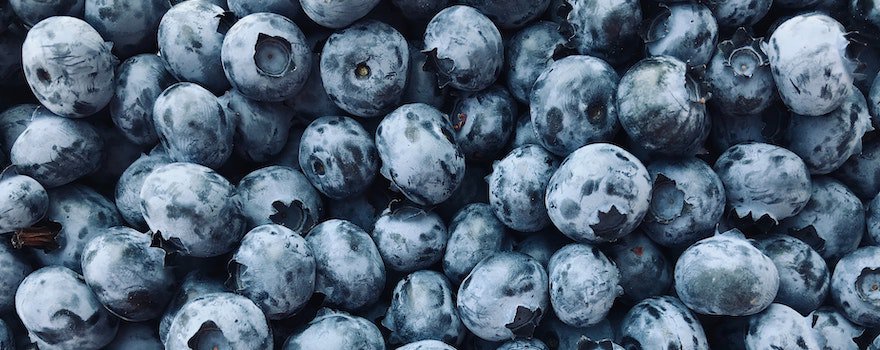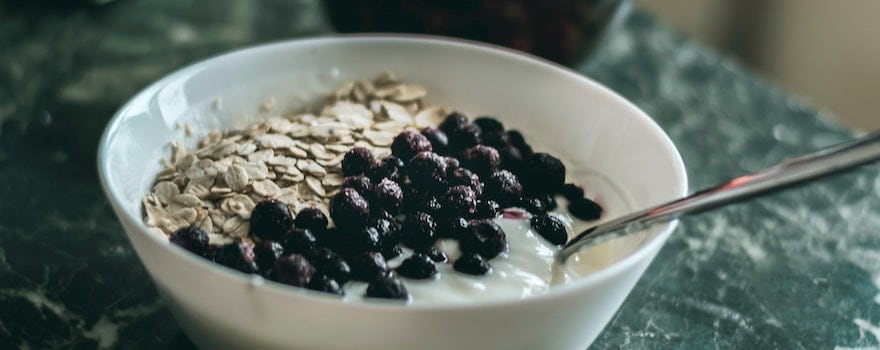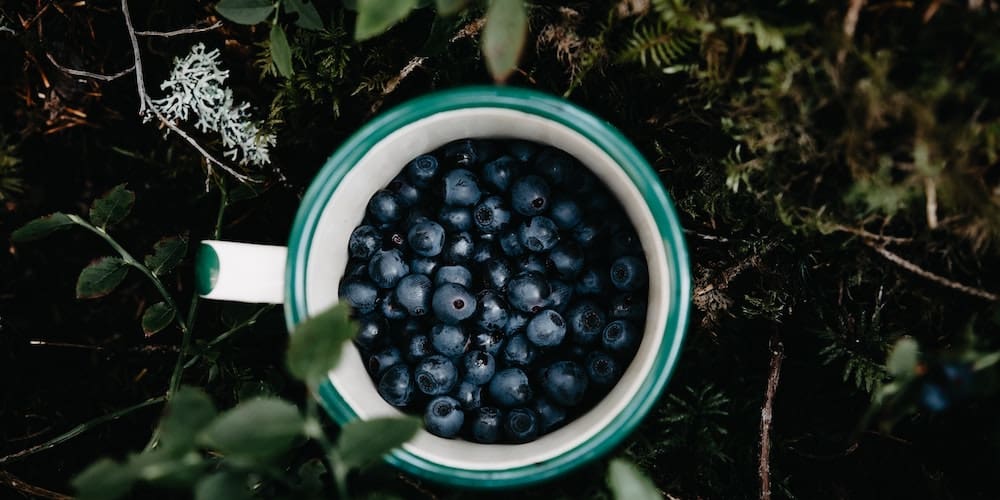BENEFITS OF BILBERRY
✓ Prevents cardiovascular disease
✓ Improves diabetes
✓ Improves memory
✓ Protects eyesight
✓ Potentially anti-cancer
What is bilberry?
The bilberry is the fruit of Vaccinium myrtillus, a small wild shrub found in Europe, Asia and North America. It is notably found in high-altitude regions, such as the Vosges or the Massif Central.
They are blue-violet berries, measure about 1 cm in diameter and weigh only a few grams.
In Europe, the bilberry has long been consumed both as a food plant and as a medicinal plant. The earliest traces of its use date back to before the Middle Ages.
It was then recognized for a beneficial effect against diarrhea, urinary disorders, and even scurvy due to its high content of vitamin C.
Since then, the blueberry has been the subject of numerous studies that have confirmed its health benefits. A great protector of the heart, it helps prevent cardiovascular disease. It is also useful for regulating blood sugar, improving memory and protecting the eyes. It has also shown promising anti-cancer effects.
Nutritional composition
- 9 amino acids
- Vitamins : provitamin A, B1, B2, B3, B5, B6, C, E, K
- Minerals and trace elements : potassium, phosphorus, magnesium, calcium, sodium, iron, zinc, copper
- Carbohydrates
- Fiber
- Antioxidant compounds : catechins, biflavonoids, anthocyanins, carotenoids
- Organic acids : malic acid, citric acid
- Water

Bilberry benefits
❤️ Prevents cardiovascular disease
Thanks to its high polyphenol content, the blueberry is a valuable ally for the heart. It acts at different levels to ensure the proper functioning of the heart muscle and to prevent cardiovascular disease.
On the one hand, it supports vascular function by improving blood circulation, vasodilation of the vessels and oxygenation of the heart.
On the other hand, the blueberry fights against risk factors cardiovascular such as high blood pressure.
This study from the University of Reading (United Kingdom), carried out in healthy men, shows how the blueberry improves vascular function.
🍭 Improves diabetes
The blueberry is a significant source of fiber with 2.4 g per 100 g. By delaying carbohydrate absorption, the fibers prevent blood sugar spikes after meals.
Moreover, like pomegranate, acerola or açai berries, blueberries contain antioxidants called anthocyanins. These natural pigments slow the absorption of sugars in the digestive tract, reduce insulin resistance and increase insulin secretion. Consuming blueberries is therefore particularly beneficial in cases of type 2 diabetes (or diabetes mellitus).
This study from the University of Reading (United Kingdom), conducted on healthy adults, shows how consuming blueberries regulates blood glucose.
🧑🏫 Improves memory
Consuming blueberries may have beneficial effects on cognitive functions, notably memory.
Thanks to their antioxidant compounds, blueberries protect the brain from free radicals, whose damage contributes to neurodegenerative diseases such as Alzheimer’s disease. They also reduce inflammation in the brain and improve connections and communication between neurons.
This study from the University of Houston-Clear Lake (United States), conducted on rats, shows how blueberries improve memory and help combat cognitive decline.
👁️ Protects eyesight
Blueberries have an ideal composition to protect the eyes and prevent certain eye diseases such as retinitis or cataracts. Their antioxidants preserve the retina and macula from oxidative damage. To do this, they inhibit the lipid peroxidation of unsaturated fatty acids in the retina.
In addition, blueberry anthocyanins improve vision in people with glaucoma or nearsightedness.
Finally, blueberries contain vitamin A (beta-carotene) which contributes to eye health and plays an important role in vision.
This study from the universities of Exeter and Plymouth (United Kingdom), conducted on men, examined the potential of blueberries to improve night vision.
🔬 Potentially anti-cancer
The high antioxidant content of blueberries gives them anti-cancer effects. Thus, their polyphenols may contribute to cancer prevention, including cancers of the skin, uterus and colon. They may also be able to block the proliferation of cancer cells and induce apoptosis (programmed cell death).
This review from Florida State University (United States) explains the anticancer properties of blueberries.

How to eat bilberry?
Fresh bilberries
The blueberry harvest runs from June to September. If you’re lucky enough to be able to pick them near you, don’t miss out ! You can also find them at market stalls or in organic stores. It’s still the best way to fully enjoy their nutritional richness and benefits.
Fresh blueberries have a fragrant taste, slightly sweet and tangy. They pair well with many dishes and can be added to yogurts, fruit salads, mueslis, porridges, pastries, sorbets… You can also turn them into juice or a smoothie, jam or jelly.
Bilberry juice
Blueberry juice has an intense, fruity taste. It is refreshing and can be drunk at any time of the day. Preferably choose a blueberry juice made from fresh, organic blueberries, without preservatives, without added sugars and without colorings.
You can also prepare your homemade blueberry juice by blending blueberries with a little water and lemon juice. Sweeten to taste with sugar, honey or lucuma powder.

Sustainable consumption: favor organic, local bilberries
✓ Along with the United States, Canada and Poland, France is one of the world’s leading blueberry producers. On average, 1,000 tonnes of blueberries are produced in the country each year. Much of the production comes from the Alps, the Vosges, Lozère or even Ardèche, a department renowned for its wild blueberries.
✓ Prefer blueberries of French origin, wild or grown organically. It is also possible to find blueberries from fair trade sources.
Dosage
In general, it is recommended to consume between 60 and 120 g of fresh blueberries per day. As juice, it is recommended to drink half to one glass per day.
Contraindications and side effects
Blueberry consumption has certain contraindications :
- Because they promote blood circulation, people suffering from bleeding disorders or who are due to undergo surgery should avoid consuming them ;
- Because of their hypoglycemic effect, people with diabetes should consult their doctor.
Excessive consumption of blueberries presents certain side effects :
- Digestive disorders
- Increased bleeding
- Allergic reaction
If you experience side effects, stop consuming them and consult a doctor.
History, cultivation and market of bilberry
For several years, global demand for blueberries has been steadily increasing. This is the case in France, which saw its blueberry consumption double in 2019. Some countries that were not necessarily expected to enter the blueberry market are now showing interest in this small berry. In South Africa, blueberry cultivation has experienced phenomenal growth. It is also the case in China and in Morocco, whose blueberries are highly appreciated internationally.
Report by Julia Perez
Sources and scientific studies
Ana Rodriguez-Mateos, Catarina Rendeiro, Triana Bergillos-Meca, Setareh Tabatabaee, Trevor W George, Christian Heiss, Jeremy Pe Spencer, 2013. Intake and time dependence of blueberry flavonoid-induced improvements in vascular function: a randomized, controlled, double-blind, crossover intervention study with mechanistic insights into biological activity.
L Bell, D J Lamport, L T Butler, C M Williams, 2017. A study of glycemic effects following acute anthocyanin-rich blueberry supplementation in healthy young adults.
Peter H Canter, Edzard Ernst, 2004. Anthocyanosides of Vaccinium myrtillus (bilberry) for night vision–a systematic review of placebo-controlled trials.
Sarah A Johnson, Bahram H Arjmandi, 2013. Evidence for anticancer properties of blueberries: a mini-review.



